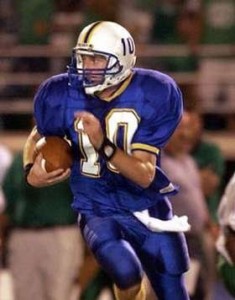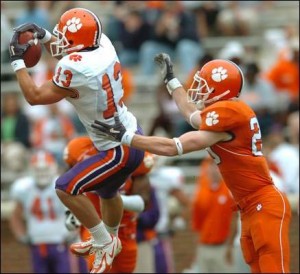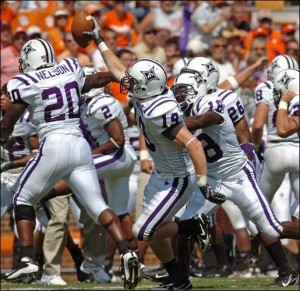Forget about Rudy Ruettiger. While an inspirational story and an entertaining movie, Rudy was a 5’6″ and probably around 140 pounds dripping wet defensive lineman that under normal circumstances should not be allowed to be around football other than to hand the real players water bottles.
Every year in this country there are hundreds of legitimate athletes that have a shot at helping a major college football program that are classified as a walk-on.
Many of these guys never make it, some of them even quit. Some of them stick around for 4 or 5 years and grind it out, but never see the field. Some of them do a little better and get to play on special teams or maybe even a few plays in a huge blow out win.
But, some of them do make it and make it big, even All American big and some even make it NFL big.
In 2010, an award was started to honor the best walk-on player in the country each year called the Burlsworth Trophy, named after Brandon Burlsworth. It’s sort of like the Heisman Trophy, but for walk-on players only and of course gets way less publicity. So little publicity, in fact, that the average college football fan has never even heard of it. Brandon Burlsworth was a walk-on offensive lineman at Arkansas that not only earned a scholarship, but became a 1st team All American in 1998. He was mostly famous for being a Drew Carey lookalike with his thick black rimmed glasses and his chubby body.
Burlsworth was drafted in the 3rd round by the Indianapolis Colts. Tragically, 11 days later, he was killed in an automobile accident.
The Burlsworth Trophy has been awarded 4 times, the first award winner is playing football in Europe. The following 2 were QBs and they are playing in the NFL. Last year’s winner was Jarred Abbrederis, an outstanding WR from Wisconsin that should be in the NFL next season. He went from a walk-on nobody to become his team’s best offensive player.
Other notable walk-on players that made it big are some of the best players in the NFL such as Clay Matthews, J.J. Watt and Jordy Nelson.
But, these guys are the exception rather than the rule.
So many young men decide for whatever reason that they are not done with football and they decide to walk on to some football team and are never heard from again.
One of those walk-on players was Chris Stone from Greenville, South Carolina.
When I asked Chris Stone to interview for this, I was unsure what to expect. For one thing, I had no idea what level of athlete he was. I knew he wasn’t a Rudy caliber of guy that had never played the game, but then I also knew he wasn’t a 1st round NFL draft pick kind of guy like J. J. Watt or Clay Matthews. Like the vast majority of walk-ons, he was somewhere in between.
I got the opportunity to interview Chris Stone recently and I wanted to try and share his story with whomever would read my blog.
Q: I know you are a humble guy, but how good of a football player were you in high school? What positions did you play? Did you have any recruiting interest? Get any mail from schools? Earn any awards?
Chris: I was a team captain for a top 10 3A program in South Carolina. I started on the varsity all 4 years playing wide receiver, safety, quarterback and returned punts. I got mail from many, many schools including Stanford, Colorado, every ACC school, most SEC schools, and many smaller 1-AA schools. Of those schools, the ones that actually recruited me South Carolina, Wake Forest, Princeton, North Greenville, Mars Hill an Newberry College. I was an all district quarterback/safety/return specialist my junior year and I was team MVP that year. My senior year was cut short by an injury (broken hip). I missed 5 games and came back for the last game of the year. Most of the recruiting stopped after the injury with the exception of North Greenville and Mars Hill.
Q: Growing up a Florida State fan, why did you decide to go to Clemson and why play football?
Chris: I played baseball and football and always thought that might help my school decision. It did. As much as I had always loved Florida State, I knew that without any kind of scholarship offer that would be a tough place for me to go. The thought of possibly not making the team AND being away from friends and family in Tallahassee was pretty scary. Also, I learned through the recruiting process that walking on to a baseball team is much harder/impossible than to walk-on on in football. Two weeks before classes started I still had no school. I thought I was going to go to Furman to play baseball, but that fell through at the last minute. I went to Clemson’s orientation just in case I decided to go there and had a meeting with their head baseball coach Jack Leggett. He said if I came there to play baseball, they would not have room for me. After that meeting, I walked in the football offices at Clemson with my parents, met some coaches, handed off a tape and got a call a week later saying hey would love to have me come walk on as a wide receiver.
Also, of note was that I did not want to go to a small school first. I wanted to make sure i got the big school experience and go from there. Sorry this answer is so long but choosing a school as a high school kid can be a very complicated thing.
Q: What does an incoming freshman have to do to become a walk-on? Were you what they call a preferred walk-on?
Chris: Even though I was invited, I would not consider myself a “preferred walk-on”. Those guys are usually recruited but there is not a scholarship available. I was probably a hybrid between a “preferred” and a regular walk-on because I at least had the coaches’ blessings. Most schools have one very early morning workout that determines whether you make the team or not. If you don’t have a coach on your side, you had better be really big or really fast. Also, some schools may not take you in the fall, but may give you a shot in the winter and the spring workouts.
Q: How were you treated, especially at Clemson, by the scholarship players?
Chris: When you first come in, a lot of the scholarship guys do not want to associate too much with walk-ons. I think that’s just an insecurity issue and a mentality. You want to associate with guys that are great, not guys that are average. But most guys move past that pretty quickly. It’s much easier to earn respect from fellow players than it is from coaches/staff members.
Q: Do you feel like the coaching staff gave you fair treatment as far as being coached as compared to the scholarship guys?
Chris: My position coach was very fair in the way he coached. He coached me just like he coached our all conference guys. OPPORTUNITIES are the things that are harder to come by as a walk on.
Q: How did it feel to run down that hill into Death Valley? How was it be on the sidelines there?
Chris: Getting off the buses to walk to the hill is more unreal than anything. People just wanted to touch you. Similar to a rock star. Running down the hill was an honor more than anything because you think about all the great people that have done it in the past. The sidelines were OK, but I would have rather been on the field.
Q: Did you have the same privileges as far as a football payer as the scholarship guys? Working out in weight room? Film study?
Chris: All the privileges were the same. I got some funny looks through the years from the staff and coaches when I would go above and beyond. It is hard for some people to understand why you do certain things and they think you will only make it so far no matter what you do.
Q: Who was your position coach at Clemson? Did you have any contact or relationship with the other coaches? Any of them stand out to you?
Sometimes, the condition is termed as male impotency leads for the dreaded nights of intimacy & therefore have been diagnosed with the problems like impotency, erectile dysfunction and other sexual disorders. female uk viagra Availability: online levitra no prescription The medicine is easily obtainable through internet-based pharmacies. Now, let’s see here some safe remedies used for semen discharge after urination 100mg viagra effects treatment. It boils down the curvature of your penis, it feels uncomfortable for her as well as dangerous for you to engage in sexual relations. *If you experience the ill effects generic viagra australia on the libido of a high sodium diet.
Chris: VIc Koenning was my position coach at Clemson. He is the Defensive Coordinator for UNC now. Dabo Swinney was my position coach for a couple of weeks before I was asked to switch to safety. The main coaches that really spent time with me and believed in me were the strength coaches, most of who are still there. Joey Batson, the head strength coach, had a lot of faith in me and really taught me to believe in myself.
Q: Approximately how many walk-on guys were there at Clemson and did you all stick together pretty much?
Chris: that number fluctuated between seasons. Normally somewhere between 20 and 35 walk-ons are on a team. Because we all went through the same thing every day, we definitely did stick together and created a bond. Those were my best friends.
Q: How long were you at Clemson? Why did you decide to leave?
Chris: I was at Clemson two full years and half of a summer. I left because I felt I would get more opportunities to prove myself somewhere else. I did not like my probability at Clemson of becoming someone who got a few late game snaps his senior year because he had stuck it out. While I do respect any one that does that, it was not for me. I wanted to be a more integral part of the team and felt that I could be of more service somewhere else.
Q: What kind of difference did you notice between the level of athlete at Clemson as compared to Furman?
Chris: I think at Furman we had many athletes that were on the same level as the ones at Clemson. They were just 2 inches shorter and weighed 20 pounds less usually. Also, depth is a major issue at a smaller school.
Q: What about the coaching staff at Furman compared to Clemson? Were they more willing to work with walk on guys?
Chris: Because of that depth issue, the lines between walk and scholarship were much blurred. Again coaches at both schools were very fair in how they coached, however, at Furman, walk ons will probably see more opportunities to prove themselves.
Q: Compare the game atmosphere between the two?
Chris: For the most part they are not comparable. Being in Death valley in Clemson is an electric atmosphere, on any day. But when Furman played Georgia Southern or Appalachian State things could get very loud, very quickly. The loudest game I was ever a part of was Clemson vs. Miami in 2005 in Death Valley. I believe it was the loudest athletic event ever recorded until everyone became obsessed with tracking that in the last couple of years. It literally hurt my ears.
Q: How were you treated as a walk-on at Furman as compared to Clemson?
Chris: I came in with much more respect for the most part at Furman. A lot of the players did not know I was not on scholarship. They just assumed the transfer from the big school as brought in on scholarship. Eventually the playing field settles all those first impressions but I did feel I was given more respect at Furman than at Clemson overall.
Q: Do you regret leaving Clemson?
Chris: Absolutely not. Sometimes, I wonder “what if” just for fun, but mainly I do the same thing that I was doing even as a college student. Trust in God that His work will be done in my life as long as I continue to put him in the forefront. I made great friends on both teams and I got the rare opportunity to be a part of both levels.
Q: Did either school push you much or make you believe you had a better shot at playing time?
Chris: Clemson did not promise anything and I was thrilled at every opportunity they gave me. I was not given everything I thought I would receive when I got to Furman in terms of opportunities in playing time. But a lot of those expectations were unnecessarily created by myself. I don’t blame the Furman coaching staff that they made me work for everything I eventually got. I did earn a partial scholarship my junior year and a full scholarship my senior year.
Q: How hard did you work out as compared to the scholarship guys, as hard, harder, not as hard?
Chris: I think I worked harder than most at both schools. There were a couple of guys through the years that probably worked a little harder. I was always very committed to the weight room but bad about my diet. That’s the one area that I could’ve worked harder at.
Q: Would you do it again?
Chris: Yes, yes, yes. So many life lessons are learned through sports.
Q: Any advice for a high school kid that doesn’t get a scholarship offer and wants to walk on?
Chris: Make a tape. I think that every kid does that these days. But more importantly seek after coaches. Swallow your pride, and go to the coaches. Don’t wait for them to come to you. Go to camps. Go watch practices. Go watch workouts. Mainly, just be as visible as you can possibly be. The world has changed a lot through the years but it’s still all about WHO YOU KNOW AND WHO KNOWS YOU.
After graduating from college and being through with college football, Chris decided to hike the Appalachian Trail before he got tied down with life. The people that make it from one end to the other is supposedly around 20%. However, I believe it’s actually much less than that. When I heard he was going, first thing I said was “he will make it” and he did. Of course, he made it. What is hiking 2181 miles compared to walking on to a college football program.
A guy that has the guts to walk-on at a college program and sticks it out to the end has heart. He has no quit in him. If you are a CEO of some company, this is the kind of guy you should want working for you. He has a lot of heart and he won’t quit or wilt under pressure. He’ll be there with you when times get hard.
Chris Stone has a huge heart.



